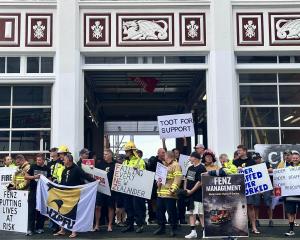
Complaints about noise coming from Port Otago have more than quadrupled since shipping giant Maersk’s Rio-class ships started berthing at the port late last year.
Residents from Harington Point to Ravensbourne say a low, thumping noise from the ship’s generators reverberates around the harbour and disrupts their sleep on Monday nights when the ships are in port.
Complaints have also been made by residents living near the ports of Napier and Lyttelton, where the ships also berth.
A petition signed by more than 140 residents asking the Dunedin City Council to address the issue was presented to the planning and environment committee meeting yesterday.
The petition asks the council to urge all parties involved in the operation of the port to investigate installing shore-to-ship power (cold ironing) at the port, due to the significant impact pollution is having on residents.
Since December, 64 complaints have been made to the council, related to container ship noise, 24 in March alone.
Careys Bay resident Blair Smith said the noise meant some harbour residents were missing nearly two months of sleep a year.
‘‘They’ve made an attempt to do something but unfortunately, they didn’t do their due diligence, because these ships are getting complaints all over the world,’’ Mr Smith said.
Both the Otago Regional Council — which owns the port — and the city council needed to do more to protect residents from the pollution (both air and noise) emitted from the port, he said.
One possible solution to the thumping noise could come from retrofitting a large absorption silencer to the generator’s exhaust pipe.
Port Otago chairman Kevin Winders said a project team — formed to find a solution to the noise issue — was investigating the possibility of trialling a giant silencer, but it could up to four months away.
‘‘This is not a five-minute fix. We’ve got a bit of a rigmarole to go through before we can get this signed off,’’ Mr Winders said.
The silencer would change the noise, rather than reduce it, he said.
Maersk was already spending about $40,000 extra a week in fuel and had changed its schedule, so the ships only spent one night in port instead of two.














